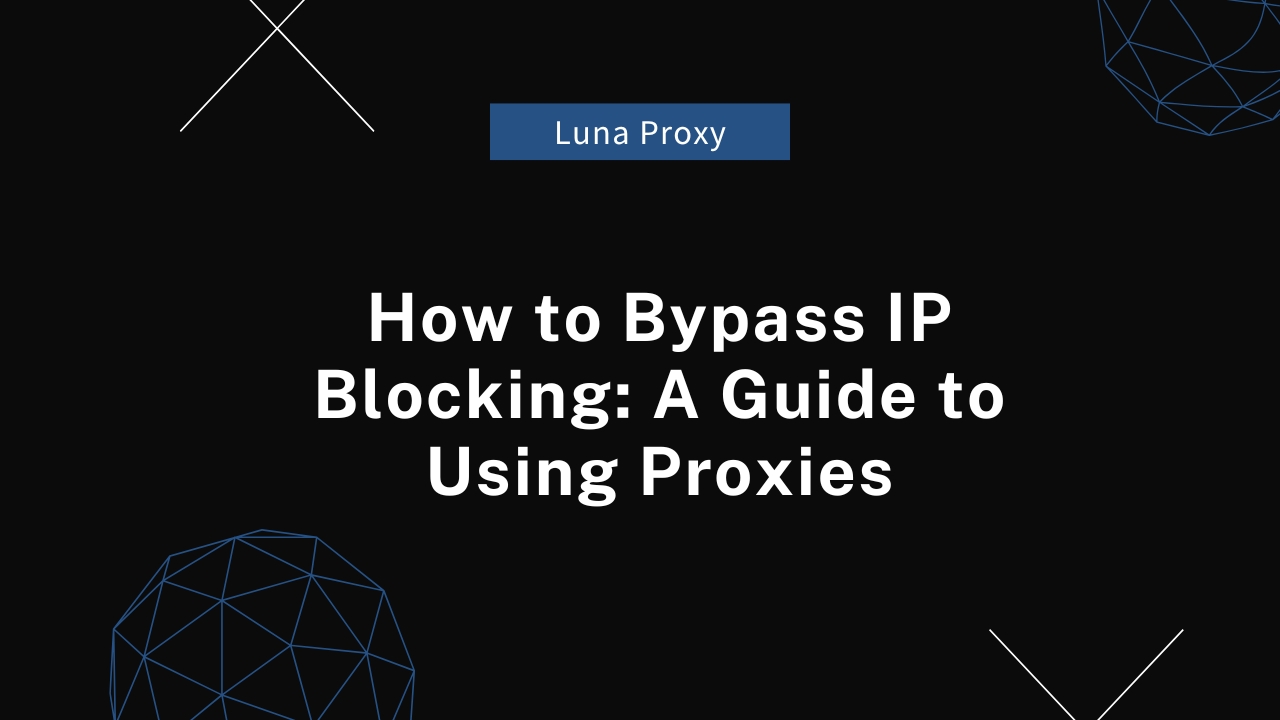
Residential Proxies added 300,000 US IP on April 9th.


AI web data scraping exclusive proxy plan [ Unlimited traffic, 100G+ bandwidth ]

 Language
Language

In today's digital world, IP blocking is a common practice used by websites and services to restrict access to certain users. This can be frustrating for users trying to access content or services that are geographically restricted or blocked due to security measures. Fortunately, using proxies is one of the most effective ways to bypass IP blocking.

IP blocking is a technique used by servers to deny access to users based on their IP address. This may happen for various reasons, such as:
Geolocation restrictions: Content maybe blocked in specific regions due to licensing agreements or censorship.
Security measures: Servers may block IPs to protect bots, or suspicious activity.
IP blocking works by identifying the user’s IP address, a unique number assigned to each device connected to the internet, and then either allowing or denying access based on preset rules.
A proxy server acts as an intermediary between your device and the internet. When you connect to a proxy, your requests are routed through the proxy server before reaching the intended website or service. This allows the website to see the IP address of the proxy server rather than your actual IP address, helping you bypass any blocks that may be in place.
HTTP Proxies: Primarily used for web browsing and work on a per-website basis. This type of proxy is useful when bypassing restrictions on specific websites.
SOCKS Proxies: These are versatile and can handle various types of traffic, such as web browsing, file transfers, and email. SOCKS proxies offer greater flexibility but may be slower than HTTP proxies.
Transparent Proxies: These do not hide your IP address but instead filter traffic and cache content. While not helpful for bypassing restrictions, they can be used for monitoring or content filtering.
Proxies provide an effective solution to bypass IP blocking for several reasons:
Access Geo-Restricted Content: Proxies allow you to route your traffic through servers located in other countries, effectively masking your original IP address.
Anonymity and Privacy: Using a proxy helps you maintain anonymity online by masking your IP address. This can protect your identity and prevent tracking or data collection
Enhanced Security: Proxies, especially those with encryption capabilities, can protect your data and prevent malicious attacks
Not all proxies are created equal. Depending on your specific needs, you may want to consider different types of proxies and features. Here are some factors to keep in mind:
Speed and Reliability: choose a high-speed proxy with a reliable uptime record.
Location of Proxy Server: If you’re trying to access content that is restricted to certain regions, choose a proxy server located in that specific region.
Security Features: Ensure that the proxy has proper encryption protocols, especially if you are using it to protect sensitive data.
Paid vs Free Proxies: Free proxies are widely available but often come with slower speeds and security risks. Paid proxies generally offer better performance, stronger encryption, and more stable connections.
IP bans are typically implemented by blocking specific IP addresses from accessing a service. By using a proxy, you can change your apparent IP address, effectively circumventing the ban. Here's how proxies can help:
Anonymity: Proxies hide your real IP address, making it difficult for websites to track your online activities or enforce bans.
Geolocation: By selecting a proxy server , you can bypass geo-restrictions and access content that is otherwise unavailable in your region.
Load Balancing: Rotating proxies can distribute your requests across multiple IP addresses, reducing the risk of being banned again.
Setting up a proxy can vary depending on the device and application you are using. Here’s a general guide:
Choose a Proxy Provider: There are many proxy providers available, offering both free and paid services. Consider factors such as speed, reliability, and the number of available IP addresses
Configure Your Device: For web browsers, you can typically enter the proxy details in the network settings. For applications, you may need to enter the proxy settings within the application's configuration.
Test Your Connection: Once configured, test your connection to ensure that your IP address is being masked. You can use online tools to verify your current IP address.
Bypassing IP blocking can be essential for accessing content, maintaining privacy, or overcoming restrictions imposed by websites, network administrators, or ISPs. Proxies offer a simple and effective solution to this problem by masking your IP address and routing your traffic through intermediary servers.
However, always remain mindful of the legal and ethical boundaries associated with proxy use. With the right approach, proxies can be a valuable tool in your digital toolkit.
